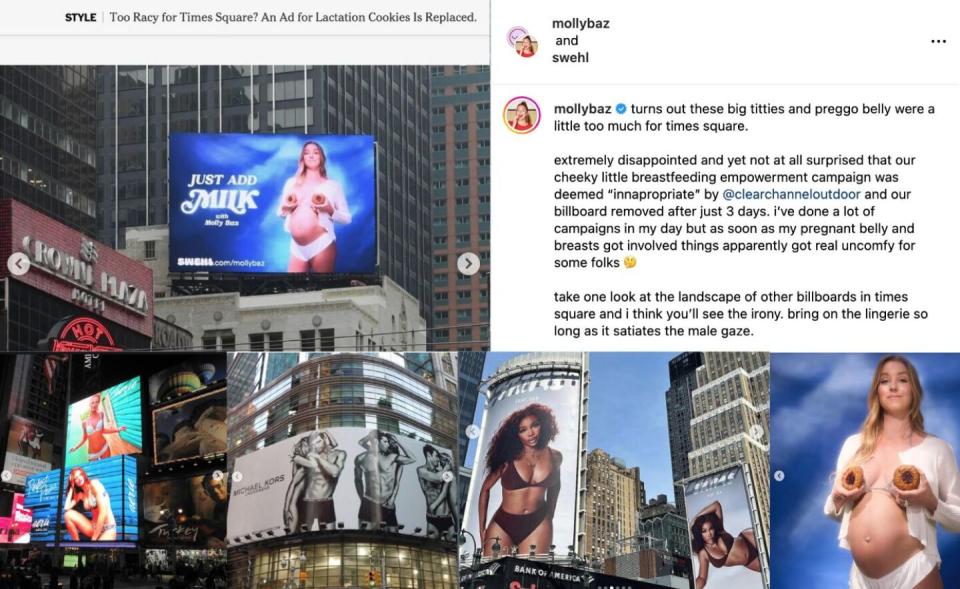When will we stop censoring pregnant and lactating bodies?

Chef and cookbook author Molly Baz was recently featured on a Times Square billboard in collaboration with Swehl to promote her new lactation cookie recipe. The dreamy photo showcased Baz, visibly pregnant, cheekily holding her “Big Titty Cookies” over her breasts with the tagline “Just Add Milk.” Breastfeeding remains a taboo subject, Baz tells Motherly, and creating the Big Titty Cookies felt like a playful way to bring light to that fact, “all while providing a service to postpartum mothers by delivering a lactation cookie recipe that is both delicious and nutritious.” The campaign was set to run for a week, but it was deemed “inappropriate” and flagged for review after just three days by the advertising company Clear Channel for violating acceptable content guidelines. It was replaced by an alternate image from the campaign featuring Baz in a crop top and jeans.
“Once the campaign was approved, up and running, I certainly didn’t expect it to then get taken down,” Baz says. “My initial reaction was utter confusion. To be completely honest, the campaign was extremely well received on my own channels on social media, so we were certainly caught off guard to learn that Clear Channel felt differently.”
Times Square is notorious for running risque ads. Taking a gander at the other billboards plastered around the block—all currently running—it’s a sea of underwear and lingerie advertisements featuring women in various states of undress.

So why is this campaign any different? We can’t ignore the fact that the models in those ads are not visibly pregnant or talking about breastfeeding.
It’s difficult to view the billboard removal as anything other than censorship of pregnant and lactating bodies, further underlining the hypocrisy that mothers can’t be sexy. The billboard takedown continues to fuel the belief in society that women’s bodies can only be deemed “appropriate” or “acceptable” when they appeal to the male gaze.
“I think the message it sends is pretty crystal clear,” Baz tells Motherly. “Women are considered beautiful, attractive, sexy, desirable when—and only when—represented in such a way that caters to a male gaze and his desires. When we show up in our actual bodies, doing the very thing they are built to do (incubate human life) which, let’s not forget, is the direct result of sexual intercourse, they’re somehow considered unappealing, inappropriate and something we shouldn’t have to look at,” she adds, noting that the big takeaway here is: “We’ve got a long way to go and some serious work to do.”
Baz posted about the billboard removal on her Instagram, generating nearly 100K likes and 2K comments, the majority of which were from equally incensed followers, including celebs, founders and brand accounts.
The backlash was feverish. “So disappointing!!!” wrote actress Kristen Bell. “This is so depressing and enraging,” wrote Emily Weiss, founder of Glossier. “ThIS PISSES ME OFF!!! Overt sexuality is fine but a pregnant woman’s body cheekily supporting breast feeding isn’t?! WHEN DO EE RIDE?!” wrote Peloton instructor Kendall Toole. “Why is America so uncomfortable with women and their bodies,” commented Mélanie Masarin, founder of Ghia, who is French.
To the Swehl cofounders, seeing the response was bolstering. “It’s been unreal to see so many founders and public figures raise their hands and say ‘this happened to me too,’” says Betsy Riley, cofounder of Swehl. “We KNOW that censorship in women’s health advertising is a real thing—we’re a breastfeeding brand dedicated to destigmatization and normalization, so we know these issues persist around breastfeeding. We’re only just starting to see real changes there.”
Even so, Riley adds, she and fellow cofounder Elizabeth Myer were shocked by the events of this week. “Evidently, even pregnant bellies are considered controversial now? When you’re selling underwear, perfume or watches it doesn’t seem like there are any standards at all. It’s so frustrating,” Riley notes.
It’s wild to see this type of censorship still happening in 2024, but it’s important to note that breastfeeding in public has only been legal in all 50 states for 6 years. (In 2018, Idaho and Utah became the last states to legalize breastfeeding in public.)

Masarin’s comment on Baz’s post is poignant: As a country, we are still highly uncomfortable with women’s bodies, especially when they’re growing or feeding a baby. And at a time when women’s reproductive rights are being rolled back—many women today have fewer reproductive rights than their own mothers did just three decades ago—censorship of a campaign celebrating pregnancy and breastfeeding is particularly disheartening. It starkly highlights the ongoing struggle to normalize and destigmatize female bodies, especially during motherhood.
As for when this type of censorship will stop? Only when we can fully shift cultural perspectives to be comfortable with the concept of women’s bodies as powerful and worthy of celebration in all forms—without reducing them to objects for the male gaze.
The timing of this incident couldn’t have been more perfect. Swehl had previously planned a “Hot Mom Walk” (all moms are hot moms, the company reminds) for the morning of May 14, four days after the billboard’s removal, which the organizers quickly transformed into a “Hot Moms March” designed to rally and protest the takedown and “celebrate a woman’s right to celebrate her pregnant belly—while fighting against the rampant censorship that women and their bodies receive.” More than 100 activists, physicians and self-identified “hot moms” took to the streets with the banned billboard in tow.
“We hope that people will keep making a fuss,” says Myer. “This campaign was never really about lactation cookies! Our message is that women deserve to hold power in designing their own experiences: in postpartum, parenting, and everywhere in between.”

